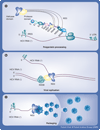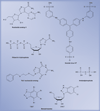Helicase inhibitors as specifically targeted antiviral therapy for hepatitis C
- PMID: 20161209
- PMCID: PMC2714653
- DOI: 10.2217/fvl.09.7
Helicase inhibitors as specifically targeted antiviral therapy for hepatitis C
Abstract
The hepatitis C virus (HCV) leads to chronic liver disease and affects more than 2% of the world's population. Complications of the disease include fibrosis, cirrhosis and hepatocellular carcinoma. Current therapy for chronic HCV infection, a combination of ribavirin and pegylated IFN-alpha, is expensive, causes profound side effects and is only moderately effective against several common HCV strains. Specifically targeted antiviral therapy for hepatitis C (STAT-C) will probably supplement or replace present therapies. Leading compounds for STAT-C target the HCV nonstructural (NS)5B polymerase and NS3 protease, however, owing to the constant threat of viral resistance, other targets must be continually developed. One such underdeveloped target is the helicase domain of the HCV NS3 protein. The HCV helicase uses energy derived from ATP hydrolysis to separate based-paired RNA or DNA. This article discusses unique features of the HCV helicase, recently discovered compounds that inhibit HCV helicase catalyzed reactions and HCV cellular replication, and new methods to monitor helicase action in a high-throughput format.
Figures





References
Bibliography
-
- HCV Working Group. Global burden of disease (GBD) for hepatitis C. J. Clin. Pharmacol. 2004;44:20–29. - PubMed
-
- McHutchison JG. Understanding hepatitis C. Am. J. Manag. Care. 2004;10:S21–S29. - PubMed
-
- Habib M, Mohamed MK, Abdel-Aziz F, et al. Hepatitis C virus infection in a community in the Nile delta: risk factors for seropositivity. Hepatology. 2001;33:248–253. - PubMed
-
- Maheshwari A, Ray S, Thuluvath PJ. Acute hepatitis C. Lancet. 2008;372:321–332. - PubMed
-
- Hu KQ, Tong MJ. The long-term outcomes of patients with compensated hepatitis C virus-related cirrhosis and history of parenteral exposure in the United States. Hepatology. 1999;29:1311–1316. - PubMed
Websites
-
- UCSF Chimera: an extensive molecular modeling system. www.cgl.ucsf.edu/chimera/
-
- UCSF DOCK. http://dock.compbio.ucsf.edu/
-
- Adaptive Poisson-Boltzmann solver. http://apbs.sourceforge.net/
-
- PyMOL. www.pymol.org/
Grants and funding
LinkOut - more resources
Full Text Sources
Other Literature Sources
Miscellaneous
